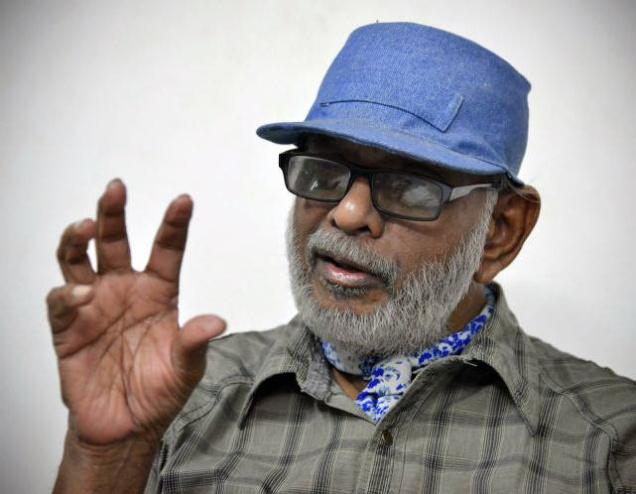 Award-winning filmmaker and cinematographer Balu Mahendra’s masterpieces — ‘Azhiyatha Kolangal’, ‘Moondram Pirai’, ‘Veedu’, ‘Sandya Ragam’ and ‘Vanna Vanna Pookal’ — left an indelible mark on the Indian film industry.
Award-winning filmmaker and cinematographer Balu Mahendra’s masterpieces — ‘Azhiyatha Kolangal’, ‘Moondram Pirai’, ‘Veedu’, ‘Sandya Ragam’ and ‘Vanna Vanna Pookal’ — left an indelible mark on the Indian film industry.
The 75-year-old master craftsman passed away in the city on Thursday. He had been admitted to Vijaya Hospital with chest pain. Doctors pronounced him dead just past 11 a.m. after he failed to respond to treatment, according to one of his assistants. He is survived by his wife and son.
The body will be kept at his film school ‘Cinema Pattarai’ in Dasarathapuram, Saligramam, for fans and well-wishers to pay homage. The final rites are expected to be performed on Friday, as the family is awaiting his son’s return to the city.
A passion for cinema
A native of Amirthakali near Mattakalappu in Sri Lanka, Mr. Mahendra came to India to study at the Film and Television Institute of India in Pune. He studied cinematography as he could not get admission in the other specialisations offered and graduated with a gold medal in 1969.
“I used to cut my cinematography classes and attend classes conducted by the departments of direction, screenplay writing and editing. However, I would to get the top rank in cinematography, so the professor did not mind it. My main concern at the time was direction and scripting with a little bit of cinematography,” he had said in an interview to ‘Frontline’ magazine last October.
His first break in the film industry came when he was assigned cinematographer for director Ramu Kariat’s ‘Nellu’ (1974) in Malayalam. His first directorial venture was the Kamal Haasan-starrer ‘Kokila’ (1977) in Kannada.
His first Tamil film was ‘Azhiyatha Kolangal’ (1979) for which Salil Chowdhry scored the music. His unique style of cinematography — making use of ambient light as much as possible — and measured narrative, without the trappings of ‘box-office formulas’, became the trademark of the alternative Tamil cinema movement that took shape through the 1980s, challenging the then mainstream.
His films fetched awards not just for himself but also his lead actors. His directorial venture ‘Moondram Pirai’ in 1983 fetched him the national award for best cinematography, and also won Kamal Haasan his first national award for acting.
Mr. Mahendra also did the rare act of working as a cinematographer for other directors even after establishing himself as an award-winning filmmaker.
“He worked as cinematographer for the debut films of many outstanding directors. He was with Bharathan when he directed ‘Prayanam’. He joined hands with Mani Ratnam for his first film ‘Pallavi Anupallavi’ in Kannada. Director Mahendran’s debut ‘Mullum Malarum’ had Mr. Mahendra as the cinematographer,” said Suka, film director and Mr. Mahendra’s student.
The camera work for K. Viswanath’s ‘Sankarabharanam’ which created waves was also handled by Mr. Mahendra.
He used to say Satyajit Ray’s ‘Pather Panchali’ had a permanent impact on him. “The impact was terrific and I could not concentrate on anything for days. It was as if I was possessed by a ghost,” he was quoted as saying.
A true mentor
Apart from being a torchbearer for quality and uncompromising cinema, Mr. Mahendra was also regarded one of the best teachers of the medium. Many of his assistant directors went on to become master craftsmen themselves.
The most prominent among them are Bala, Vetrimaaran and Seenu Ramasamy. Director Vetrimaaran, who won the national award for best director and screenplay for the 2011 film, ‘Aadukalam,’ said Mr. Mahendra was a ‘father figure’ to him. “I lost my father 16 years ago but never felt his absence in my life because he (Mr. Mahendra) was there for me,” he said. “Today for the first time, I feel the loss of a father.”
An avid reader of books, Mr. Mahendra exhorted his assistants and even the journalists who interviewed him to broaden their horizons by reading local literature to understand not just storytelling but also culture.
During the promotions of his last film, ‘Thalaimuraigal,’ which was a poignant tale of a man’s relationship with his grandson, Mr. Mahendra said, “This film is my contribution to my future generations. One should never forget one’s ancestors.”
